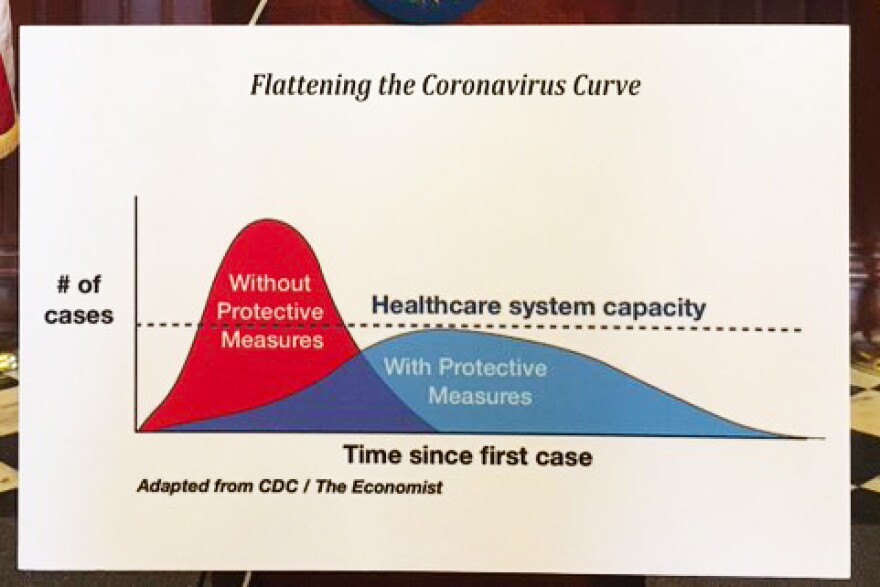Gov. Phil Scott declared a state of emergency Friday evening in response to the coronavirus, restricting visitor access to longterm care facilities and prohibiting gatherings of more than 250 people. But his executive order stopped short of closing Vermont's public schools, which will remain open for the time being.
Scott said his administration was enacting mitigation strategies intended to slow the spread of COVID-19 and protect Vermonters more vulnerable to the illness.
"While many will not get it or see mild symptoms, we all have to do our part to protect the older Vermonters and those at risk," he said.
Sign up to receive email updates from VPR about the new coronavirus here.
The governor said additional steps could be necessary to slow the spread of the virus.
“There is no doubt these are difficult steps that, for a few weeks or possibly months, will change what we do in our daily lives and I also need you to know more may be necessary,” Scott said. “But the compassion and commitment of our people and communities will see us through. We have to rise above frustrations and fear. We can’t focus on how this may set us back because what it’s really about is who we are as Vermonters, and how we’re going to lead our state forward.”
Scott said closing schools was not seen as an effective measure at this point, though he added parents should prepare for that possibility in the future.
"We will not hesitate to act should the risk change," Scott said.
There are currently two people in Vermont who have tested positive for COVID-19. Scott said it is only a matter of time until there are more.
The executive order will remain in effect until April 15 — a span of time that could be shortened or lengthened, Scott said — and includes:
- Restricted access to longterm care facilities, with exemptions for families of children and of terminally ill patients
- Prohibition of gatherings with 250 or more people
- Suspension of non-essential out-of-state travel for state employees
Scott said both state commissioners and other employers are encouraged to facilitate their employees working from home as much as possible.
"We're going to act together, and we're going to get through this together," he said.
The governor's announcment came a couple hours after President Donald Trump declared a national emergency, which will unlock billions of dollars in state and local aid.
Earlier in the day, the Vermont Legislature adjourned until at least March 24 to close down the statehouse. Some committees can work remotely, though Senate President Pro Tem Tim Ashe said no votes will occur.
In Canada, the government advised its citizens to avoid international travel, and Prime Minister Justin Trudeau, whose wife, Sophie Grégoire, has tested positive for coronavirus, said the government may tighten Canadian borders. Citing that decision, Jay Peak Resort, which relies heavily on Canadian visitors, announced it is closing its slopes for the season.

At the governor's press conference, Health Commissioner Mark Levine explained the administration's measures as a way to prevent a spike in coronavirus cases and not overwhelm Vermont's healthcare system.
"We want to flatten the curve," Levine said.
He added that according to mathematical models the state is using to make its public health decisions, closing schools for two weeks now likely won't be as effective as possibly closing them in the future, and for longer.
"Obviously a longer closure would have larger implications," Levine said.
In the meantime, Levine said the health department has updated its guidance to advise anyone traveling from most of Europe to self-quarantine for 14 days.
The governor acknowledged an increasing source of concern and frustration as the outbreak spreads: That people showing symptoms of COVID-19 cannot access tests.
“We don’t have an unlimited number of tests,” Scott said. “If we did, maybe we would test more. But we don’t, and we have to be honest about that, that we’re doing all we can at this point in time.”
Find a list of Frequently Asked Questions about the new coronavirus, plus resources, here.
Scott said the visitor ban at longterm care facilities will be painful. But he said it was necessary to protect vulnerable residents.
“I know this will be very difficult for everyone involved, but we also know the residents of these facilities and those seeking care at our hospitals are most at risk.”
The ban on gatherings of 250 people does not include grocery stores or other retail outlets. But it applies to churches, sporting events, concerts and base lodges at ski areas.
“I understand the disruption this will cause, as well as the economic impacts,” Scott said. “But we’ve seen its effectiveness in other countries, and we must do our part.”
University of Vermont Health Network CEO John Brumsted supported Scott’s decision.
“Governor Scott’s emergency declaration is a significant action that will allow the state of Vermont and health care providers to act quickly and decisively to reduce the spread of COVID-19,” Brumsted said in a written statement. “Vermont hospitals are well trained and well prepared and we have an incredibly dedicated and capable workforce to meet this challenge.”
Questions, comments, concerns or experiences you want to share about the new coronavirus? Fill out VPR's brief survey here.
Scott's emergency order also authorizes the Vermont Department of Labor to provide unemployment compensation for Vermonters who have to be quarantined for the coronavirus.
"We will treat that as a temporary layoff, and for that isolation period, they'll be eligible for benefits," Labor Commissioner Michael Harrington said. He added that system will be put into place over the weekend.





